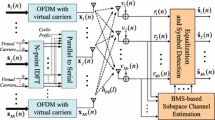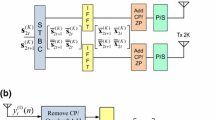Abstract
This paper investigates the blind algorithm for channel estimation of Orthogonal Frequency Division Multiplexing-Multiple Input Multiple Output (OFDM-MIMO) wireless communication system using the subspace decomposition of the channel received complex baseband signals and proposes a new two-stage blind algorithm. Exploited the second-order cyclostationarity inherent in OFDM with cyclic prefix and the characteristics of the phased antenna, the practical HIPERLAN/2 standard based OFDM-MIMO simulator is established with the sufficient consideration of statistical correlations between the multiple antenna channels under wireless wideband multipath fading environment, and a new two-stage blind algorithm is formulated using rank reduced subspace channel matrix approximation and adaptive Constant Modulus (CM) criterion. Simulation results confirm the theoretical analysis and illustrate that the proposed algorithm is capable of tracking matrix channel variations with fast convergence rate and improving acceptable overall system performance over various common wireless and mobile communication links.
Similar content being viewed by others
References
S. Haykin, Adaptive Filter Theory, Fourth edition, Englewood Cliffs, New Jersey, USA: Pearson Education, Inc., 2002, 324–341.
Ahmod R. S. Bahai, Burton R. Saltzberg, Multi-Carrier Digital Communications, Theory and Applications of OFDM, Dordrecht, Netherlands: Kluwer Academic Publishers, 1999, 23–48.
Wei Bai, Blind channel estimation in OFDM-MIMO systems, IEICE Trans. on Commun., E85-B(2002)7, 1849–1853.
L. Hanzo, W. Webb, T. Keller, Single- and Multi-Carrier Quadrature Amplitude Modulation: Principles and Applications for Personal Communications, WLANs and Broadcasting, West Sussex, England: John Willey & Sons Ltd., 2000, 126–220.
C. R. Johnson, et al., Blind equalization using the constant modulus criterion: A review, Proceedings of the IEEE, 86(2000)10, 1927–1948.
Du Jiang, Peng Qicong, Li Yubei, Adaptive blind equalization for MIMO-OFDM wireless communication systems, Proceedings of ICCT2003, Beijing, China, April 2003, 1455–1478.
H. Matsuoka, Y. Murakami, H. Shoki, Y. Suzuki, A smart antenna receiver testbed with directional antenna elements, IEEE International Conference on Phased Array Systems and Technology, Dana Point, CA, May 2000, 113–116.
S. R. Saunders, Antennas and Propagation for Wireless Communication Systems, West Sussex, England: John Willey & Sons, Ltd., 1999, 330–345.
B. Muquet, M. de Courville, Blind and semi-blind channel identification methods using second order statistics for OFDM systems, Proc. ICASSP, Phoenix, Arizona, USA, 1999, vol.5, 2745–2748.
Author information
Authors and Affiliations
About this article
Cite this article
Du, J., Peng, Q. Adaptive blind estimation algorithm for OFDM-MIMO radio systems over multipath channels. J. of Electron.(China) 21, 441–448 (2004). https://doi.org/10.1007/s11767-004-0001-x
Received:
Revised:
Issue Date:
DOI: https://doi.org/10.1007/s11767-004-0001-x




